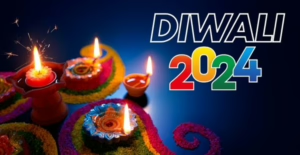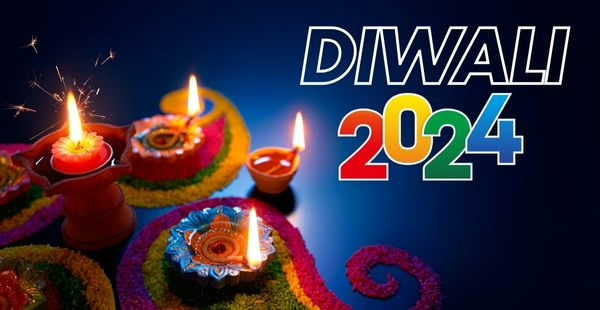
Diwali, also known as Deepawali, is one of the most cherished festivals in India and among Indian communities globally. Celebrated with great enthusiasm, it marks the triumph of light over darkness, good over evil, and knowledge over ignorance. As we approach the Diwali 2024 date celebration on October 31, it’s time to delve into its rich history, cultural significance, and ways to celebrate it meaningfully.
When is Diwali 2024?
In 2024, Diwali will be celebrated on October 31. The festival typically falls between mid-October and mid-November, depending on the lunar calendar. Diwali is observed on the 15th day of the month of Kartika in the Hindu calendar. The specific date can vary based on regional customs and the sighting of the moon, making it a festival that can hold different meanings and significance across various communities.
The Significance of Diwali
Historical Roots
Diwali is steeped in various myths and legends that explain its significance. The most famous story is that of Lord Rama returning to his kingdom of Ayodhya after defeating the demon king Ravana. His return after 14 years of exile was celebrated with the lighting of oil lamps, marking the beginning of the festival of lights significance.
Another significant tale is that of Lord Krishna, who defeated the demon Narakasura, symbolizing the victory of good over evil. In South India, this victory is particularly celebrated, adding a regional flavor to the overarching themes of Diwali.
Cultural Significance
Diwali transcends its religious origins, embodying themes of unity, love, and community. For many, it marks the beginning of the new year and is a time for renewal and reflection. It encourages people to forgive past grievances, strengthen family bonds, and embrace a spirit of togetherness.
Spiritual Meaning
The spiritual essence of Diwali encourages individuals to dispel ignorance and negativity. Lighting diyas (oil lamps) symbolizes the illumination of the mind, representing knowledge and wisdom. The festival serves as a reminder to cultivate inner light and spread positivity in the world.
Preparations for Diwali
As the festival approaches, preparations often begin weeks in advance. Here’s a closer look at how families typically prepare for this vibrant celebration:
Cleaning and Decorating Homes
A significant part of Diwali preparation and shopping involves thorough cleaning of homes. This act symbolizes the removal of negativity and the welcome of positive energy. Once cleaned, homes are decorated beautifully with:
- Rangoli: Intricate patterns made from colored powders, rice, or flower petals at the entrance of homes.
- Diyas and Lights: Homes are adorned with diyas, fairy lights, and candles, symbolizing the triumph of light over darkness.
- Torans: Decorative door hangings made from marigold flowers and mango leaves, enhancing the festive atmosphere.
Shopping and Gifting
Shopping is a hallmark of Diwali. Families often purchase new clothes, gifts, and sweets to share with loved ones. Traditional attire, such as sarees for women and kurtas for men, is commonly worn during the celebrations. The act of giving and receiving gifts reinforces relationships and strengthens community ties.
Preparing Sweets and Snacks
No celebration in India is complete without delicious food. Families prepare a variety of sweets and savory snacks for Diwali, including:
- Gulab Jamun: Soft, syrup-soaked balls made from milk solids.
- Jalebi: Crispy, spiral-shaped sweets soaked in sugar syrup.
- Samosas: Spiced potato-filled pastries, deep-fried to golden perfection.
The Days of Diwali
Diwali celebrations span five days, with each day holding its own significance:
Day 1: Dhanteras
The first day of Diwali is Dhanteras, a day that celebrates wealth and prosperity. It is customary to buy new utensils, gold, or silver on this day, symbolizing a good start to the new year. People also light diyas to invite Goddess Lakshmi, the goddess of wealth, into their homes.
Day 2: Naraka Chaturdashi (Choti Diwali)
The second day, Naraka Chaturdashi, also known as Choti Diwali, commemorates Lord Krishna’s victory over Narakasura. On this day, people perform rituals for cleansing and preparation for the main festivities.
Day 3: Diwali (Lakshmi Puja)
The third day is the main Diwali celebration, marked by Lakshmi Puja, where families gather to pray for prosperity and abundance. Homes are decorated with flowers, lights, and rangoli, while fireworks illuminate the night sky, celebrating the festival’s joyful spirit.
Day 4: Govardhan Puja
The fourth day honors Govardhan Puja, celebrating Lord Krishna lifting the Govardhan Hill to protect villagers from rain. In many regions, a small mound of cow dung is created to symbolize the hill, and prayers and food are offered to it.
Day 5: Bhai Dooj
The final day of Diwali is Bhai Dooj, dedicated to the bond between brothers and sisters. Sisters pray for their brothers’ well-being, and brothers promise to protect their sisters and often give gifts in return.
Diwali Traditions and Customs
Diwali is rich in Diwali traditions and customs, varying across regions and communities. Here are some common practices observed during the festival:
Lighting Diyas
Lighting diyas is a central custom of Diwali. Families place these oil lamps in their homes, balconies, and rooftops to symbolize the arrival of Goddess Lakshmi and to dispel darkness.
Fireworks
Fireworks are an integral part of Diwali celebrations. The sound and light of firecrackers are believed to ward off evil spirits. However, there is an increasing emphasis on eco-friendly celebrations due to environmental concerns.
Prayers and Offerings
Families perform prayers and rituals, offering sweets and fruits to deities. The common practice is to pray to Lord Ganesha for removing obstacles and to Goddess Lakshmi for wealth and prosperity.
Community Celebrations
In many cities, communities come together to celebrate Diwali with fairs, cultural programs, and community dinners. This fosters a sense of unity and togetherness among residents.
Diwali Celebrations Around the World
While Diwali is primarily celebrated in India, its spirit transcends borders. Here’s how Diwali celebrations around the world are observed:
Nepal
In Nepal, Diwali is known as Tihar and lasts for five days. Each day is dedicated to honoring different animals and deities, including crows, dogs, cows, and brothers.
Sri Lanka
In Sri Lanka, Tamil communities celebrate Diwali with vibrant decorations, special prayers, and the preparation of sweets. Fireworks are also common, lighting up the night sky.
Fiji
In Fiji, Diwali is celebrated with great enthusiasm, especially among the Indo-Fijian population. The festival includes cultural performances, traditional dances, and community feasts.
Mauritius
Mauritius has a significant Hindu population, and Diwali is one of the most celebrated festivals. The island is adorned with lights, and families come together for prayers and festivities.
Modern Celebrations: Balancing Tradition and Innovation
As the world evolves, so do the ways we celebrate Diwali. Many families are now incorporating modern elements while preserving traditional customs. Here are some modern trends in Diwali celebrations:
Eco-Friendly Practices
With growing awareness of environmental issues, many are opting for eco-friendly celebrations. This includes using biodegradable decorations, reducing firecracker usage, and choosing sustainable gifts.
Digital Celebrations
In the age of technology, virtual celebrations have gained popularity. Families separated by distance use video calls to connect, share moments, and even participate in rituals together.
Charity and Giving Back
In recent years, there has been a growing emphasis on giving back to the community during Diwali. Many individuals and organizations participate in charitable activities, distributing food, clothing, and gifts to those in need.
Conclusion
Diwali is more than just a festival; it’s a celebration of life, love, and unity. As we prepare for the Diwali 2024 date celebration on October 31, let us remember the essence of this beautiful festival – to illuminate our lives with positivity, strengthen our bonds, and spread joy. Whether you celebrate with grand festivities or intimate gatherings, may your Diwali be filled with light, laughter, and love.
This year, as you light your diyas and burst your crackers, take a moment to reflect on the deeper meanings of Diwali. Embrace the spirit of the festival by fostering compassion, understanding, and generosity. Happy Diwali!

